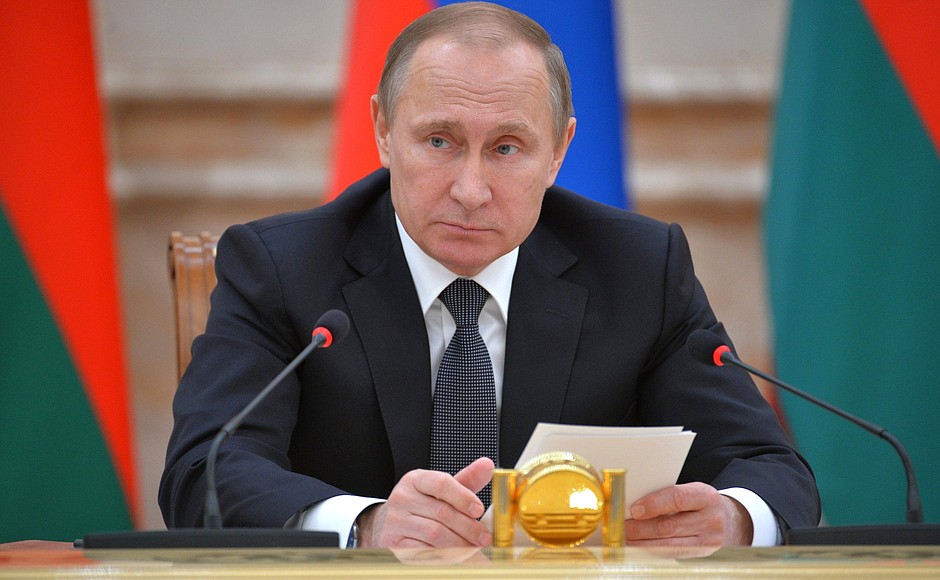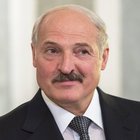
President of Belarus Alexander Lukashenko: Mr Putin, friends, allow me to welcome you to Minsk, to Belarus.
We continue to build our Union, to implement our projects in difficult conditions. The global economic instability, crisis of confidence in international relations, escalation of armed conflicts and flare-up in information warfare are challenging our integration. However, the current situation should not affect our priorities in the Union State’s work. The most important among them is comprehensive cooperation for the good of our peoples.
Constructive dialogue in politics, the economy, security, and the social and cultural sectors remains the key to achieving common integration goals. I am confident that we have all the conditions to achieve it.
Recently, when meeting with the President of Russia in Sochi, we reiterated our desire to strengthen Belarusian-Russian cooperation in all areas, to resolve any problems that occur.
Today, the most pressing issues in union-building will be discussed at the Supreme State Council meeting, issues that should be to that high level without affecting our bilateral relations, where we resolve current issues.
Priority attention should be given to the economic aspect. Unfortunately, we are not taking full advantage of the potential our bilateral trade and economic ties hold. In a global economic downturn, I doubt this is justifiable. We must think together – and the President and I have already agreed to do so – about how to coordinate our resources and use them to the maximum degree.
See also
Unfortunately, this is the third year when we are seeing a drop in mutual trade: in 2015, it decreased by more than a quarter. We can and must overcome this negative trend through our joint efforts.
Any imbalances in the relationship between our nations or inconsistencies in how we conduct our economic policies are sensitive for our mutual trade; we just discussed this, as well. So we are both interested in eliminating barriers, ensuring the effective functioning of a common market for goods, services and capital, and providing mutual support.
During today’s meeting, we will also discuss ways to meet the Union State’s proposed priority development targets and objectives for the medium-term. Having identified them a year ago, we must clearly understand where we have made progress and where we are lagging.
Leading global powers and neighbouring nations are paying close attention to Belarus and Russia’s foreign policy activities and the military aspects of our cooperation. Another important issue on our agenda is examining and approving a coordinated action programme in foreign policy of the states – parties to the Treaty Establishing the Union State through 2016–2017. It is imperative for us to fully take into account the effective experience we acquired when working to implement the previous similar document.
The ongoing military and political crises, the return of many nations to a bloc-oriented mentality and widespread use of sanctions as an instrument of political pressure are forcing us to keep our powder dry, so we gave particular attention to defence building today.
Overall, our main objective is to make the best use of all the platforms and formats for further development of cooperation and effective decision-making. I think you will agree that we have all the necessary conditions to work in coordination, consistently, like clockwork, within the framework of the integration association we have created.
Colleagues, as we open our meeting, I would like to follow the tradition and give the floor to President of the Russian Federation Vladimir Putin.
President of Russia Vladimir Putin: Mr Lukashenko, colleagues, friends,
In the course of today’s Supreme State Council meeting, we are to make a number of important decisions on the further development and strengthening of the Union State of Russia and Belarus.
Over the past years, since the decision to launch this process, we have achieved a great deal, particularly to strengthen close trade and economic ties, as well as those in science, technology, education and culture, and enhance the contractual and legislative basis in various areas of cooperation.
Successful cooperation between Russia and Belarus has promoted the development of integration in the entire CIS space. Our achievements have been extensively used in the creation of the Customs Union and later the Common Economic Space and, finally, the Eurasian Economic Union.
Currently, as Mr Lukashenko said, our Union State has come across certain challenges caused by the instability on global markets and a drop in the prices of energy resources, raw materials and foods. Unfavourable external factors caused a reduction in our mutual trade in 2015, as it was already mentioned. It did not drop significantly in physical terms, by only 4 percent, but in monetary terms, the reduction was more noticeable. We do understand, of course, that this drop is also linked to a drop in the prices of our traditional goods.
At the same time, I am convinced that both Russia and Belarus have sufficient internal reserves that will allow us to restore the stable economic development of the Union State and return mutual trade onto a path of stable growth. This is what we should focus on while implementing certain provisions in the programme documents approved in March 2015, which are also reflected in the action plan to create conditions for trade and economic cooperation and the list of priority development targets for the Union State until 2017.
It is important to organise the work of our economic agencies, focusing them on improving the business and investment climate, and promote the activities of the working group on macroeconomic coordination. We should also continue the practice of joint board meetings of the two countries’ economic ministries.
We must enhance our multifaceted industrial cooperation and conduct a more coordinated economic policy. During our discussion in a narrow group, we noticed certain issues that occur in practice and that could be avoided.
We also agreed to achieve greater harmony in norms and regulations in industry, currency and finance and the services sector. The development of cooperation, primarily in high technology, should become the key factor of Union State economic growth. We must increase the share of high technology products and replace foreign-made components, especially in sensitive industries that directly affect the security of our countries.
We have certain achievements in this area. In December 2015, we created a joint Union company Stankoengineering and launched the joint production of microelectronics within the framework of special programmes.
There has been further progress in the creation of a single navigation space of Russia and Belarus based on the GLONASS system. We are implementing Earth remote sensing projects.
Energy cooperation between our countries is of a strategic nature. The construction of a Belarusian nuclear power plant is progressing rapidly. This is one of our flagship projects. I would like to remind you that Russian capital investment amounts to $10 billion. The fist power unit is to be launched in 2018, the second – in 2020.
Russia is helping Belarus to modernise its gas transportation system. In addition to the investment already made, by 2020 Gazprom intends to invest an additional $2.5 billion into the economy and this project in particular – the Belarusian section of the Yamal-Europe gas pipeline, and over $1 billion into increasing underground storage capacity.
Inter-regional cooperation can also be beneficial for economic ties. In 2015 more than 40 delegations from Russian regions visited Belarus, 14 of them led by heads of the corresponding regions of the Russian Federation.
I would like to thank Mr Lukashenko for giving so much attention to this area of cooperation and personally receiving our colleagues from the regions. I intend to take part in the 3rd Forum of the Regions to take place in Minsk in June.
Joint social and humanitarian cooperation programmes play a special part in strengthening ties within the Union. Significant resources are allocated from the Union State budget for these purposes in the coming year as well. I would like to highlight the successful implementation in 2015 of the Union State plan of events to mark the 70th anniversary of Victory in the Great Patriotic War and the liberation of Belarus from Nazi occupation. I am convinced that we should always focus on preserving the memory of the most important events in our common past, preventing any attempts at falsifying history and educating the younger generation in the spirit of patriotism.
Among the traditional issues that we discuss almost constantly is greater coordination on the international arena. We intend to analyse the implementation in 2014–2015 of the coordinated foreign policy programme of action and approve a new draft programme for the following two years.
In conclusion, I would like to say that Russia is intent on moving ahead along the path of mutually advantageous integration with Belarus within our Union State. I am certain that we will see the same resolve on the part of our Belarusian friends.
Thank you for your attention.
